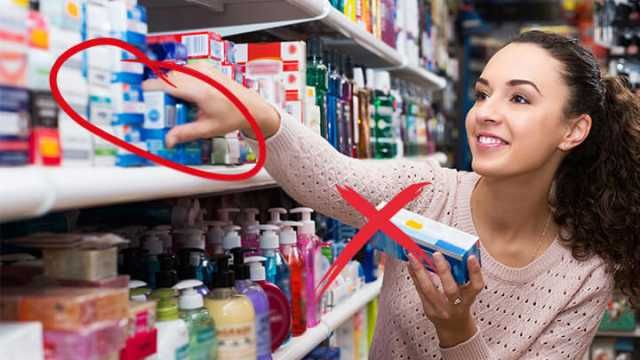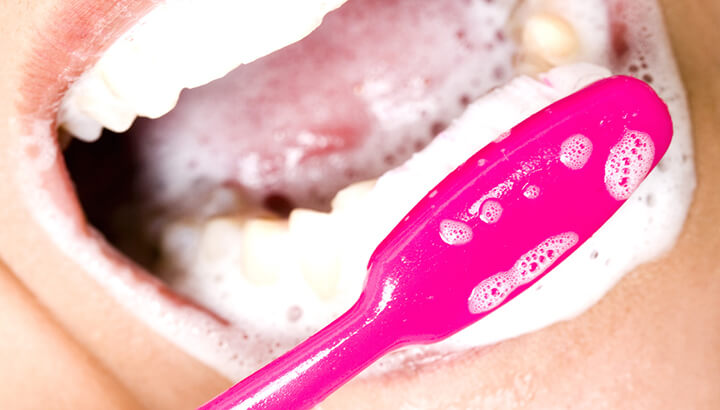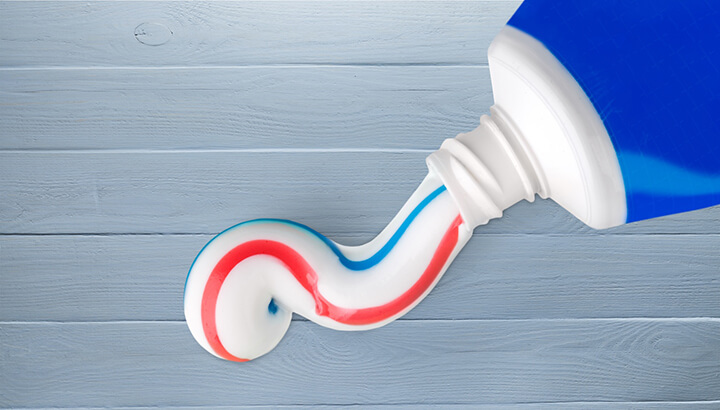
Toothpaste is one of those products that seem like they should be pretty benign. It’s a very routine part of our everyday lives, as we use it more than once each day. As with so many products, the thought that there could be something detrimental about a products as “normal” and common as toothpaste may seem farfetched at first. But the reality is, a potentially cancer-causing substance may be found in some brands of toothpaste.
Back in September, the FDA banned triclosan, an antibacterial substance, from soaps. Findings suggested that long-term exposure could lead to negative health impacts, like bacterial resistance or effects on hormones. And a 2014 study found that triclosan could be associated with liver cancer in mice.
Nonetheless, some toothpastes, like Colgate Total, still contain triclosan because it may help to prevent plaque and gingivitis. With that in mind, you may feel inclined to switch to a more natural toothpaste. Here are a few additional reasons why that can be a good idea. A quick note: just because a toothpaste claims to be “natural” on the box does not mean that it actually is or that it contains no harmful ingredients. Before selecting a toothpaste, it is recommended that you research the brand and any specific products you’re interested in.
Sodium lauryl sulfate

A lot of conventional toothpastes contain sodium lauryl sulfate, the chemical that helps toothpaste to foam. However, it can also interfere with the proper functioning of taste buds. It has been linked to canker sores and skin irritation. And what’s most problematic about sodium lauryl sulfate is that the manufacturing process may cause it to be contaminated with potentially carcinogenic byproducts. It may also release carcinogens and toxins into the environment.
Artificial sweeteners and flavors
Of course, many types of toothpaste contain artificial sweeteners and flavors, both of which have a range of potentially negative health effects. One study, for example, showed that the daily consumption of beverages containing artificial sweeteners was associated with an increased risk of metabolic syndrome and diabetes. And another study found that, due to their sweetness, artificial sweeteners may actually lead us to crave sweets more. This ultimately leads to weight gain, the very thing they claim to help prevent.
Artificial flavors can be damaging to your overall health, as well. For example, one study found that there are a number of toxic effects associated with regularly consuming artificial flavors. And be aware that so-called “natural flavors” are often, in fact, not terribly different from “artificial flavors.”
Preservatives
Many of us are aware that we should avoid preservatives in our foods. But you may not realize that preservatives are present in many toothpastes, as well. The same study mentioned above that examined the toxic effects of artificial flavors also showed similar effects associated with artificial colors and preservatives.
Fluoride

As you may have heard, there is a great deal of controversy surrounding fluoride and whether it is beneficial or detrimental to our health. It has been suggested that fluoride can help to prevent tooth decay by forming a protective layer on the teeth. But one study demonstrated that this layer is, in actuality, only six nanometers thick. This means it would take 10,000 layers to equal the thickness of one hair. Scientists have begun to question whether such a thin layer can actually provide protection to the teeth and enamel, after all.
Fluoride has been linked by studies to brain damage, lower IQ in children, hyperactivity, bone cancer, genetic damage and other deleterious effects.
Diethanolamine (DEA)
This common toothpaste ingredient is another of the ingredients that contribute to toothpaste’s ability to foam. It is a known hormone disruptor. In addition, it can interact with other toothpaste ingredients to form NDEA. That’s a potential carcinogen that is thought to be linked to cancers of the stomach, liver, bladder and esophagus, as well as a number of other negative impacts.
Propylene glycol
Propylene glycol is a mineral oil that, in the industrial grade form, is also used in antifreeze and airplane de-icers — not exactly the kind of thing you want to ingest! It’s known to irritate the eyes, skin and lungs. And it is believed that it may cause organ system toxicity.
As we can see, commercial toothpastes contain a number of harmful ingredients that are certainly not needed to keep your teeth clean and healthy. Truly natural toothpastes are a much more beneficial and safer option. Or if you prefer, a quick Google search will return many recipes for homemade toothpaste recipes. Although, you will want to do some research to confirm the effectiveness of these. And because many of the harmful ingredients are found in other health and beauty products as well, switching to natural products whenever possible is highly recommended.
— Sarah Cooke

